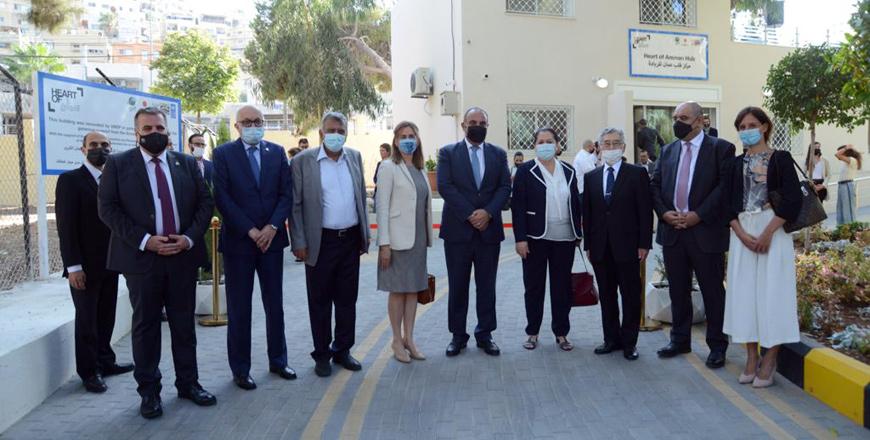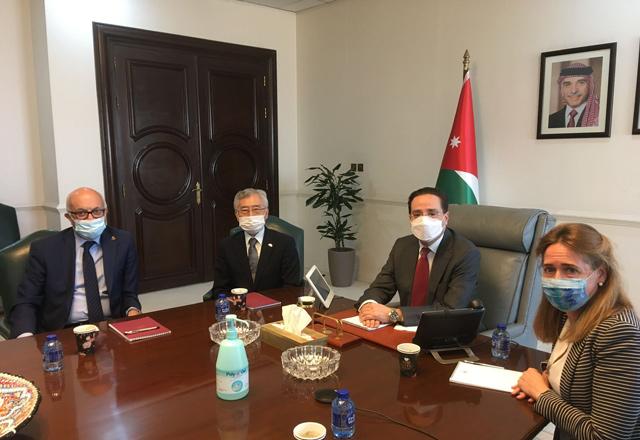You are here
UNDP report sheds light on opportunities for inclusive COVID recovery among Arab states
By JT - Jul 02,2022 - Last updated at Jul 02,2022
AMMAN — Arab states should strengthen capacities, build effective and trustworthy institutional structures that can support a new social contract and enable societies to cope with future shocks and disasters to recover from the impacts of the COVID pandemic, according to the Arab Human Development Report (AHDR) 2022 that the United Nations Development Programme (UNDP) launched on Wednesday.
“Many countries in the Arab states region are still struggling to contend with the devastating socio-economic effects of COVID-19, now compounded by an unprecedented global food, energy and finance crisis that is being precipitated by the tragic war in Ukraine,” said Achim Steiner, UNDP administrator.
“This new report analyses how countries across the region can get hard-won human development gains back on track through concerted efforts in four key areas. That includes building diversified and competitive economies; shaping accountable and responsive governments founded upon the protection of human rights; nurturing inclusive and cohesive societies; and driving forward a green recovery with sustainable human development at its core,” he said in a UNDP statement.
Produced by UNDP’s Regional Bureau for Arab States (RBAS), the AHDR 2022 is titled “Expanding Opportunities for an Inclusive and Resilient Recovery in the Post-Covid Era.”
The report reviews impacts of the pandemic on human development across the region, as well as actions taken by Arab states to contain the outbreak and mitigate its most adverse impacts on people and the economy. The AHDR 2022 argues that getting human development back on track in the post-pandemic era will require greater efforts to make governance systems more accountable and responsive, economies more diversified and competitive and societies more cohesive and inclusive to ensure a resilient recovery for all.
“The Arab states region has been experiencing various vulnerabilities and is notable for a diverse range of development contexts but the rapid onset of the global pandemic challenged all to varying degrees, presenting new challenges and exacerbating vulnerabilities. But as the report tells us, vulnerabilities are not our destiny,” said Khalida Bouzar, UNDP assistant administrator and director of RBAS.
“Full of potential and brimming with innovative efforts, the region adopted many positive response measures that could be expanded and scaled-up beyond the COVID response. Knowledge and solutions to tackle the region’s challenges exist. Many are known and have been tested and shown to work. Our collective endeavour now is to create the conditions to allow these efforts to blossom and reach fruition,” Bouzar said.
The report observes that trust in government is critical to COVID response.
The report underscores that the region’s economy contracted by around 4.5 percent in 2020, with fragile and conflict-affected countries experiencing the largest average drop—around 15 percent.
Despite positive signs at the end of 2021, the report notes that an accelerated recovery in 2022 is unlikely, given emerging challenges facing the region, says the report.
The report points out that prior to the pandemic, inadequate public financing had placed the burden of healthcare on patients. Out-of-pocket spending averaged 28 per cent of household spending in the region, compared with 18 per cent worldwide but with significant variations from a low of 6.6 per cent in Oman to a high of 81 per cent in Yemen.
The report also estimates that the pandemic resulted in a 5 per cent increase in water demand in 2020 for intensified hygiene practices, adding pressures on already scare water supplies across the region, where 18 of the 22 Arab states face serious levels of water scarcity and the average person receives just one-eighth of the global average renewable water per person.
The report calls for prioritising improved water governance and enhanced waste management as key components for post-COVID recovery to be sustainable and resilient.
Among the report’s recommendations include:
Investment in enhancing accountability and responsiveness of governance systems and structures and fostering economic diversification and resilience, by focusing investments on high-productivity goods and services, expanding exports through greater integration with global value chains and tackling persistent unemployment and labour markets challenges.
The report also calls for enhancing social cohesion and inclusion through inclusive and equitable access to quality social, health and education services; pursuing social cohesion and consensus-building initiatives; enabling greater civic participation and negotiation in the workplace; promoting gender responsive laws and investing in care policies and services; and ensuring inclusion of marginalised and vulnerable groups in all aspects of the recovery, especially women, migrants, refugees and people with disabilities.
Additionally, the report recommends ensuring that recovery pathways are green, through accelerating and scaling-up clean energy transition initiatives, expanding green transportation and infrastructure investments and closing gaps in water and waste services, among others.
Related Articles
AMMAN — The Heart of Amman, a United Nations Development Programme flagship initiative, launched Jordan’s first Social Entrepreneurship Cent
AMMAN — Environment Minister Nabil Masarweh met with UN Assistant Secretary General and Director of the Regional Bureau for Arab States at t
AMMAN — The Government of Japan and the United Nations Development Programme (UNDP) met with representatives from the Government of Jordan o













